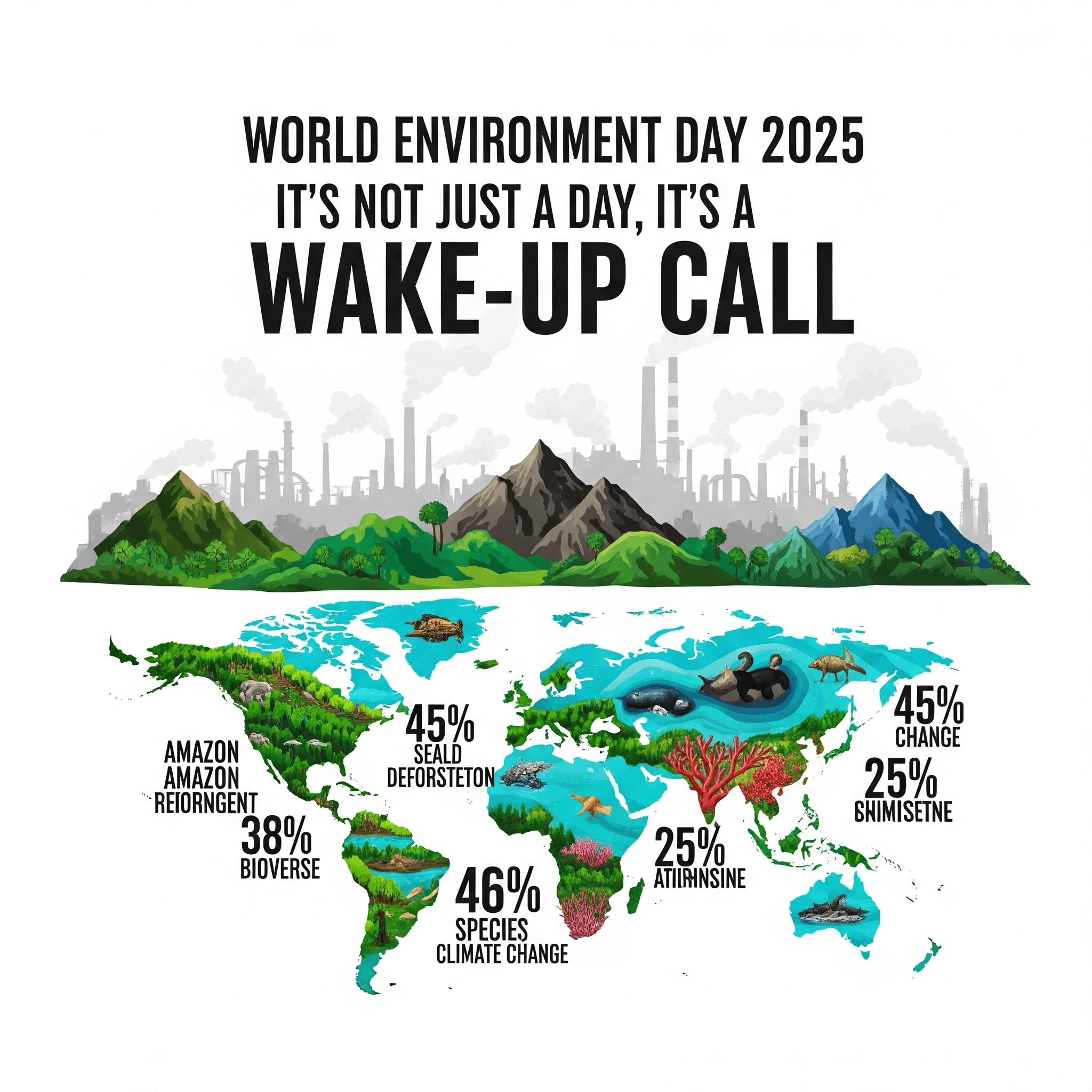World Environment Day 2025: It’s Not Just a Day, It’s a Wake-Up Call
Every June 5th, the world is given a voice—a loud, insistent, sometimes celebratory, sometimes grieving voice—and it is heard around the world: World Environment Day. But in 2025, it’s more than just a day to plant a tree or share an infographic. It’s a rallying cry, a global pulse check, a time of reckoning—and action.
Let’s be clear about that: the environment is no longer a “cause.” It’s the foundation of our economy, health, food systems, and futures. It’s not a niche field for activists and green warriors. It’s everyone’s business.
The Theme for 2025: “Restore. Rewild. Rethink.”
The yearly theme is an empowering trilogy: Restore. Rewild. Rethink.
Why?
Because we’re past the point of merely holding onto what we have. Now we have to restore lost or ruined ecosystems—wetlands, forests, coral reefs. We need to rewild—let nature take back its space and let biodiversity heal. And above all, we need to rethink—how we live, produce, consume, and coexist with nature.
Restoration: Healing the Earth Like You’d Heal a Wound
The Amazon is no longer the world’s lungs—it’s struggling to breathe. Land loss is threatening global food security. The rivers, wetlands, and green belts have been suffocated by urbanization.
Restoration is the art and science of healing. It’s bringing life to vacant sites and transforming them into green belts. It’s regenerative agriculture, tree planting that respects biodiversity, and wetland reviving.
It’s not just in the countryside. Cities are erecting vertical forests, and empty lots are being turned into neighbourhood gardens. Every reclaimed square meter can cool the planet, clean the air, and absorb carbon.
Rewilding: The Return of Nature’s Heroes
Imagine wolves returning to Yellowstone, igniting a chain reaction that restored rivers to their former glory. That’s rewilding.
This is not a fantasy—it’s a proven ecological strategy. Rewilding restores keystone animals like beavers, elephants, and wildcats to their native habitats.
Urban rewilding is gaining traction too—wildflower corridors, bee highways, and pollinator parks are emerging between city blocks.
Rewilding is proof that if we give nature a chance, it comes roaring back.
Rethink: We Can’t Fix Things with the Same Mind That Broke Them
Plastic isn’t just in oceans—it’s in our bloodstream. Microplastics are present in babies even before birth.
We must rethink:
- – Fashion: From fast fashion to circular fashion.
- – Food: From industrial agriculture to local, seasonal, plant-rich diets.
- – Energy: From fossil fuels to community-controlled, decentralized renewables.
- – Design: From linear to cradle-to-cradle design.
Even our definition of progress must change. GDP should not grow at the expense of fresh air and clean water.
The Wave of Innovation: Tech Meets Earth
Environment Day 2025 is not just about ideology—it’s about green innovation:
- – AI for Climate: Satellite-based forest observation for predicting droughts.
- – Green Hydrogen: Clean energy buzzword of the decade.
- – Vertical Farming: 90% less water, no pesticides.
- – Bioplastics: Made from algae, fungus, or seaweed.
- – Carbon Capture Startups: From mechanical trees to basalt rock reactors.
Saving the world isn’t just noble—it’s good business.
The Human Story: Environmentalism with a Soul
Let’s not forget the people:
- – Farmers resisting drought in Kenya.
- – Island nations losing land to rising seas.
- – Indigenous communities guarding 80% of global biodiversity without recognition.
Environmental justice is equity—who gets clean air, green parks, and safe water? Who pays for pollution? Who benefits from green growth?
This is not just a science issue—it’s a moral issue.
You, Me, and 8 Billion Earthlings: What Can We Do?
Revolutions begin in daily life. You can:
- – Use banks that don’t fund fossil fuels.
- – Cut meat one day/week—save 100kg CO₂/year.
- – Support green startups.
- – Organize community cleanups.
- – Plant native species.
- – Speak up. Share. Influence. Make it viral.
Every move is a message. A ripple. A wave.
The Road Ahead: Not Utopia, but Possibility
World Environment Day 2025 is a checkpoint. Are we progressing? Are we listening? Can we resist convenience for survival?
Optimism is not denial—it’s uprising.
Nature is resilient. But it needs our help.
The Earth doesn’t need to be rescued. We do.
Final Thought:
Let’s flip the script—from fear to hope, concern to action.
Every time we restore, we heal.
Every time we rewild, we invite wonder.
Every time we rethink, we learn.
The future is green—only if we choose it.


Leave a Reply
You must be logged in to post a comment.